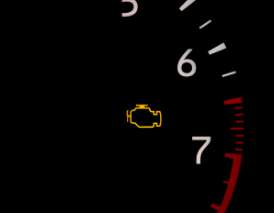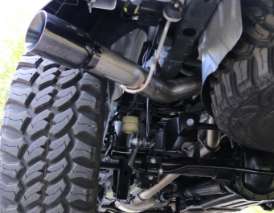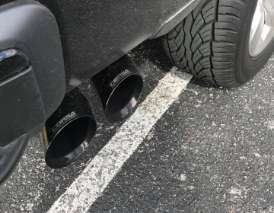The catalytic converter is an essential component of your vehicle's exhaust system, used to filter out pollutants created during the combustion process. When a manufacturer places a catalytic converter in your exhaust system, it usually lasts the lifetime of your vehicle. Because of this, people generally don't know what's going on with their vehicles when they begin having catalytic converter problems – they only know something is off. Luckily, when you know what to look for, the signs of a bad catalytic converter are easy to spot. In this article, we'll go over six common symptoms of a bad catalytic converter so you know when yours needs replacing. Keep reading to find out more.
Table of Contents
|
> Why Are Catalytic Converters Important? |

Why Are Catalytic Converters Important?
Before you learn how to tell if your catalytic converter is bad, you should understand what a catalytic converter does and why it has been the vehicle standard for nearly 40 years. Catalytic converters are comparable to the last line of defense against air pollution from vehicles. Your catalytic converter is filled with a honeycomb structure of precious metals like palladium, rhodium and platinum that act as a catalyst to filter out harmful contaminants from your exhaust. If your vehicle runs on gasoline or diesel fuel, your exhaust system regularly releases gases like carbon monoxide, sulfur dioxide, lead, nitrogen dioxide and ground-level ozone.
In the 1970s, people began to understand the harmful effects these gases can have on the environment. Vehicle manufacturers created catalytic converters to break down the unburned gases during the combustion process. Catalytic converter catalysts reach temperatures up to 800 degrees Fahrenheit and convert toxic gases into safer elements for humans and the environment, like carbon dioxide, oxygen and water.
Why Do You Need to Replace a Bad Catalytic Converter?
Catalytic converters are included in cars to help reduce air pollution. While most people think this is a compelling enough reason to fix a bad catalytic converter, there are other practical reasons why you'll want to diagnose the symptoms of a clogged catalytic converter as soon as possible. With a bad catalytic converter, you won't pass the emissions testing required in 34 of the 50 states. In addition, if you continue driving with a bad catalytic converter, it can eventually overheat and cause the engine to shut down for good. That's why you need to be on the lookout for these signs of a catalytic converter going bad.
1. Your Check Engine Light
Modern vehicles are equipped with a check engine light. This light will trigger when a sensor discovers a problem with your vehicle – this can include a bad catalytic converter. Newer engines have oxygen and air/fuel sensors to measure if your catalytic converter operates within tolerance levels. By monitoring exhaust gas levels, your car's internal computer will know when you're driving with a bad catalytic converter and trigger your check engine light. While this is one of the easiest methods of troubleshooting a catalytic converter, your sensors may not always catch the problem right away.

2. Your Acceleration Has Turned Sluggish
If you notice your engine is suddenly going through a dramatic loss of power and you can't accelerate the same as before, you may be experiencing one of the most common clogged catalytic converter symptoms. Your engine's ability to take in clean air and expel exhaust gases are tied together – a clog in the exhaust interrupts this process. If you have a clogged converter, your engine won't mix air and fuel efficiently enough, resulting in less powerful combustion, power and poor acceleration.
Shop CORSA PERFORMANCE for Exhaust System Upgrades
If you need to replace your bad catalytic converter, you might want to think about upgrading some of the other components in your exhaust system. At CORSA, we have an extensive selection of high-performance exhaust systems available for vehicles of all types. Help your engine and catalytic converter breathe better with an aftermarket exhaust system upgrade today.
Shop High-Performance Exhaust Systems
3. You're Getting Fewer Miles to the Gallon
Do you feel like you're filling up your tank more frequently than you used to? A bad catalytic converter usually means poor fuel efficiency. Your engine relies on O2 sensors to adequately mix oxygen and fuel – a clog can lead the sensor to believe it's getting more air than it is, subsequently injecting more fuel than you can actually use in the process. This is called "running rich." It can further the buildup in a bad catalytic converter if it's already clogged.

4. You Can Smell the Difference
When your catalytic converter runs as it should, all the chemicals and gases your vehicle produces within your exhaust system are converted into safe compounds. However, if you're having catalytic converter problems, you'll frequently notice the smell of rotten eggs or sulfur coming from your exhaust. Driving around with unpleasant-smelling harmful gases pouring into your cab can leave you with health problems or lightheadedness while driving – both of which are potentially fatal issues. If your catalytic converter problems reach this stage, it's essential to replace the component immediately.
5. Your Engine Misfires
The performance of your engine, and your vehicle, depends on complete fuel combustion. A bad catalytic converter will lead to incomplete combustion within the firing cylinders causing an engine misfire and making it challenging for your car to start. Any time you notice frequent engine misfires, you're experiencing the signs of a bad catalytic converter that needs a replacement.
6. You Hear Rattles From Your Engine6. You Hear Rattles From Your Engine
Bad catalytic converter symptoms often manifest themselves in the form of sound, especially if you're used to using a super-rich fuel mixture for your ride. What does a bad catalytic converter sound like? Often, a clogged catalytic converter sounds like a rattling noise is coming from under your vehicle and engine when you're starting, idling or driving.
Excess heat or damage in the converter can break apart the honeycomb materials, resulting in the rattling noise. If you hear these abnormal rattles coming from your vehicle, don't ignore them, as the problem will only get worse over time and lead to further damage.
Replacing a Bad Catalytic Converter
Now that you know the symptoms of a failing catalytic converter, replacement is just around the corner. Replacing a bad catalytic converter is easier than you may think. Everyone is different, but the process commonly only takes about an hour. And, if it's time to replace a bad catalytic converter, you may want to consider upgrading your entire exhaust system at the same time. If you install an aftermarket cat-back exhaust along with high-flow cats, you'll enjoy improved emissions quality and increase your engine's power output.
Not to mention, it could be a great time to consider a set of aftermarket headers to update the entirety of your exhaust system.
After Replacing Your Bad Catalytic Converter, Head Over to CORSA For the Rest of Your Exhaust
CORSA has been an industry-leading manufacturer of top-of-the-line aftermarket exhausts for over 25 years. After you've replaced your bad catalytic converter, you might want to consider upgrading your entire system with a high-quality exhaust to maximize the true potential of your engine. With our expert craftsmanship and RSC® (Reflective Sound Cancellation®) technology, you can expect your vehicle to stay in top shape for longer, drive better and sound great. If you have any questions about our products, feel free to contact us at any time. Our team of experts is always standing and ready to help. Shop CORSA PERFORMANCE today.
Shop Exhaust Systems By Vehicle



![[CLOSE OUT] Black / CORSA Men's T-Shirt | Exhaust Tips](http://www.corsaperformance.com/cdn/shop/products/IMG_0485_edit_square.jpg?v=1756140526&width=104)

![[OPEN BOX ITEM] 3.0 in Downpipe | 2015-23 Ford Mustang EcoBoost 2.3T (14344)](http://www.corsaperformance.com/cdn/shop/files/14344-2015-2019-ford-mustang-ecoboost-downpipe-3-0-sport-to-xtreme-14344-downpipe-745179021328_63440e1a-d143-4f51-9a01-bbec5072ab45.jpg?v=1756140056&width=104)



